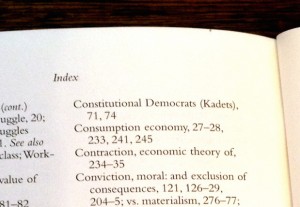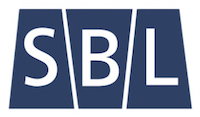I find that an index evaluation exercise is a great way to remind myself and any new indexers I’m mentoring about how important our indexing principles and best practices are to the reader or browser’s experience of a book or other document.
It’s actually quite easy to identify some of the worst offenders in index construction. Good indexing practice is often a matter of common sense.
I have room in this post for just a couple of the most egregious errors in index organization. Please, in your own indexes, do try to avoid these. Index users will thank you. 🙂
An Overabundance of Locators
Hebrew University, 12, 26, 42–43, 60, 65, 68, 70, 80, 107, 108, 110, 111, 112, 113, 117, 118, 155, 164, 176, 188
Sometimes more is not better. This is the single most common problem in indexes I’ve been asked to update. Long strings of locators (page numbers or whatever identifier) with no or sometimes just two or three subheadings that look like leftovers—talk about intimidating! Imagine flipping back and forth over and over twenty or more times to see if the mention on that page is significant. The author in this case wanted every mention of a topic or name regardless of significance. We only found four real significant mentions. The rest were trivial. Four would have been much more useful, and much less time-consuming.
Look, Ma, They’re All in the Same Place!
genres
adventure, 8, 146
comical, 8
defined, 21
diaries, 8
governmental, 8
historical, 8
military, 8
mystery, 8
national, 8
nihilist, 8
philosophical, 8
philosophic-scientific, 8
romance, 8
short stories, 8
social, 8, 185
stories of the strange, 8
tales of the marvelous, 8
utopian, 8
See also fantasy genre; science fiction genre
Well, not all in the same place but many are. You can see the temptation here from the indexer’s perspective: On page 8 there’s a long list of these literary genres. The author only takes his time discussing the ones that have mentions on other pages later in the book. So, the temptation is to make this long list under the general topic of “genres” and end up repeating the page over and over, increasing the user’s scanning time. So, how to handle this so we don’t lose the more specific information in the subheadings but without creating this list here at the “genre” main heading?
For this situation, best indexing practice says to make sure that the index user has access at main heading level to significant mentions of both general and more specific topics. Keep in mind that more specific topics should be visible as main headings first since folks tend to use the index to look for more specific topics. That said, we don’t want to totally neglect the “genres” heading either. We’re also taking into consideration that the audience for this scholarly work will consist primarily of folks who already know the names of these genres (and they are listed on page 8 to give them a jumpstart). So, here’s how I’d make this index entry a bit more useful by using main headings primarily:
adventure genre, 8, 146
comical genre, 8
diaries, 8
fantasy genre, 2, 91–92, 143, 146, 156, 185, 187n5
genres, 8, 21. See also specific genres by name
governmental genre, 8
historical genre, 8
military genre, 8
mystery genre, 8
national genre, 8
nihilist genre, 8
philosophical genre, 8
philosophic-scientific genre, 8
romance genre, 8
science fiction genre….[big entry with lots of significant subheadings]
short stories, 8
social genre, 8, 185
stories of the strange, 8
tales of the marvelous, 8
utopian genre, 8
Keep in mind that there would be lots of other main headings between all of these terms and they’d be easier to scan on their own as main headings. Also, at “genres,” we don’t want to lose anyone who did look up this general term, so we give the page 8 where the list is and the page 21 with the definition and then suggest that the user look up the different genres by name.
Our job is to get the user as quickly as possible and without distraction to the page where the information they are looking for resides. Indexing often resembles the sculpting process. When the indexer doesn’t take the time to do the final cuts and shaping, the index cannot be considered to be finished.





Leave a Reply